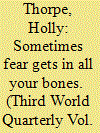| Srl | Item |
| 1 |
ID:
116857


|
|
|
|
|
| Publication |
2012.
|
| Summary/Abstract |
This paper explores some of the cross-cultural friendships of Western NGO workers with Indonesians, before and after the 2006 earthquake in Yogyakarta. These kinds of friendships enabled aid workers to transcend a private-professional divide which is often taken for granted. The paper draws attention to different cultural ideals of friendship and argues that cross-cultural friendships present a central instrument for establishing emotional belonging and for crafting identities. The social competences gained frequently moved beyond the individual private sphere and were turned into meaningful resources and professional qualifications relevant in development work. I argue that friendships act as mediators allowing aid workers to oscillate between different spheres of social engagement. This intermediate potential renders friendships highly relevant to more in-depth anthropological enquiry into development workers' everyday lives and their cultural positioning in foreign environments.
|
|
|
|
|
|
|
|
|
|
|
|
|
|
|
|
| 2 |
ID:
171924


|
|
|
|
|
| Summary/Abstract |
In the context of increasing risk for aid workers, a growing body of scholarship is focused on risk management in contexts of humanitarian assistance and development work. Much less attention, however, has been given to how staff and volunteers experience such risks. This paper adopts a feminist geographical approach to explore how development workers make meaning of risk in specific contexts. Adopting a qualitative approach, it draws upon 14 semi-structured in-depth interviews with international (7) and local (7) staff of an international educational and sporting non-governmental organisation (NGO) in Afghanistan. After exploring differences between local and foreign staff perceptions of risk, it also offers a gendered analysis of risk for women development workers in Afghanistan. In so doing, this paper contributes to the growing body of literature in ‘Aidland’ studies by revealing the complex understandings of risk and fear by both foreign and local staff in the same geographical and organisational context. For NGOs seeking to make life-saving decisions based on the calculation of risk, this paper evidences the need to also create space for the voices of local and foreign staff whose experiences of risk will be highly relational, embodied, gendered and context specific.
|
|
|
|
|
|
|
|
|
|
|
|
|
|
|
|